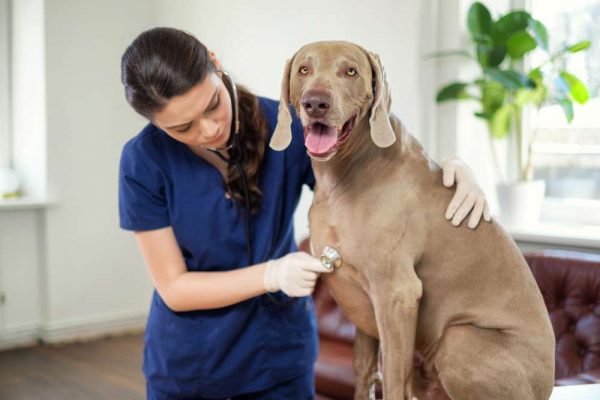A natural treatment for Cushings certainly starts with your dog’s diet. But it does not stop there. There are also some relatively inexpensive and effective supplements that can help you control your dog’s Cushing’s disease.
Cortisol – Good or Bad for Your Dog?

Every dog has cortisol in his body. In normal dogs, it helps balance glucose (blood sugars) and it breaks down fats, proteins and carbohydrates to provide fuel for your dog’s body.
When a dog’s body produces too much cortisol, problems develop. Symptoms of high cortisol usually develop gradually and get worse over time.
- Frequent infections because the immune system is weakened
- Your dog may develop diabetes mellitus
- Muscle wasting
- Weakness of muscles, especially in the hind legs
- Unhealthy skin that breaks down easily and may have dark spots and sores
- Increased thirst and urination, sometimes with incontinence
- Huge appetite, can’t get enough to eat
- Abnormal amount of stomach acid which can cause ulcers
Controlling your dog’s diet, along with supplements and/or medications can help keep his cortisol levels down.
Diet for Dogs with Cushing’s
If your dog has been diagnosed with Cushing’s, one of the first things you can do to help her is make sure her diet is appropriate for her disease. There are a couple of approaches to this.
The raw food diet is recommended by some vets and breeders. Others, however, believe that you can give your dog the best nutrients by carefully choosing a good dog food.
When a dog has Cushing’s, she has elevated cortisol, which becomes cortisone in her body. This is part of the reason that she develops so many symptoms.
Cortisol helps your dog’s body respond to stress, and it also affects many of her regular body functions. Your dog’s body will produce more cortisol naturally during times of stress:
- Pain
- Trauma or injury
- Temperature changes
- Infection or illness
- Stressful or upsetting situations
Here’s what you should be looking for in a dog food:
Adult formula
Your dog’s food should be formulated for adult or senior dogs. It should meet the standards of the American Feed Control Officials’ (AAFCO) recommendations. Dog foods that claim to meet the needs of all ages of dogs are not good enough.
Some vets recommend a high quality dog food made from raw meats and vegetables. It should contain high quality proteins such as eggs, and foods like beans and potato skins to supply a high amount of potassium. Good quality protein should make up 75% of your dog’s diet. Here are 3 excellent choices:
- Purina Pro Plan with Probiotics
- Hill’s Prescription Diet for Weight Management– especially good if your dog has gained a lot of weight
- Nutro Natural Choice
Fat and Fiber
Dogs with Cushing’s have elevated levels of triglycerides and cholesterol. To help control these levels, look for a food that is lower than 12% fat on a dry matter basis and moderate (8-17%) in crude fiber on a dry matter basis (DM). Keeping your dog’s diet low in fat helps prevent the development of pancreatitis.
Low Sodium
Because dogs with Cushing’s often develop high blood pressure, it’s a good idea to keep the sodium in your dog’s diet low.
Dog Treats
Commercial dog treats have a lot of fat and unknown ingredients that may be doing harm to your dog.
Why not consider making your own dog treats? Rye flour contains lignans, which are healthy for dogs with Cushing’s, so consider using it in your dog’s treats. Or just give your dog a healthy treat like a bean or a slice of a carrot?
Water is Critical for Dogs with Cushing’s
Dogs with Cushing’s become exceptionally thirsty, and they need to drink water. Never limit the amount of water that your dog drinks. Make sure that he always has clean water to drink in his bowl.
And, if you need to leave your dog at home alone while you are away, consider an easy to clean automatic water dispenser that will provide fresh water as it’s needed.
Natural Treatments for Canine Cushing’s
In addition to a good diet, your dog may benefit from a few herbs and supplements that are proving to help with this condition. Cushing’s is a complicated disease, and you may have to experiment a bit in order to get the best treatment for your dog. If an approach is working, you should see a positive difference in your dog within 2-4 months.
In addition, the cost of tests and conventional treatment for canine Cushing’s can be astounding, placing a financial burden on many pet parents. Using herbs and supplements is safer and more gentle for your dog, and much more affordable for you.
Lignans and Melatonin
Lignans are chemical compounds that come from plants like flaxseeds, sesame seeds, pumpkin seeds and rye. There are 2 types that we see most often in supplements: HMR lignans come from the Norway Spruce tree and flaxseed lignans that come from flaxseed hulls. Both types of lignan inhibit enzymes in a dog’s body that help produce cortisol. In other words, they help to control the production of cortisol.
Melatonin works as a partner to lignans because it helps slow cortisol production by inhibiting different enzymes. Because they affect different enzymes, melatonin and lignans work well together.
While most vets still recommend medications or surgery for Cushing’s, there are several recent studies by top vets that show success using lignans and melatonin. In fact, studies show that lignans and melatonin not only reduce cortisol levels, but they also act directly on the tumors.
In contrast to the harsh medications usually prescribed for Cushing’s, lignans and melatonin are very gentle. They can be used even if Cushing’s is only suspected, not yet confirmed. Using these supplements cannot cause Addison’s disease, and will not harm your dog. There are no known side effects and you don’t have to do expensive testing to monitor the effect on your dog’s body.
A word of caution: Do not use whole flaxseeds or flaxseed oil. The lignan content in these is very low and they can actually increase your dog’s triglycerides, already a problem with Cushing’s. The flaxseed hulls contain the lignans concentration that will help your dog.
The combination of lignans and melatonin work well for both normal Cushing’s and atypical Cushing’s (caused by excessive steroids).
Dosage for Melatonin and Lignans
Neither of these supplements will hurt your dog, but there are recommended amounts that will have the most benefit. The dosages below are suggested, and they can be altered for your dog, if needed.
Melatonin – For melatonin to work, you need to keep a constant level in your dog’s body. Do not use a timed release or rapid release product.
If your dog is under 30 lb, give your dog 1.5 mg once or twice daily.
For dogs over 30 lb, try 3 mg once or twice daily.
For very large dogs who are more than 100 lb, try 6 mg once or twice daily.
Lignans – You can give your dog his lignans once a day, or split the dosage into 2 portions and give them twice a day. The dosage is based on your dog’s weight.
Give 1 mg of SDG flax hull lignans daily for each pound your dog weighs. For example, if your dog weighs 20 lb, his daily dosage would be 20 mg lignans.
For HMR lignans, give 10-40 mg daily, depending on your dog’s size.
There is also a combination formula for dogs, made to treat Cushing’s naturally. Easy to use, without the fuss of measuring, it is called CushAway.
What to Expect with Natural Treatment for Cushing’s
What kind of results can you expect if you choose to treat your dog with supplements? In one study, 85% of dogs treated with lignans and melatonin showed improvement in at least one symptom within 2 months, a few within just 2 weeks. Others said it took up to 4 months. Some pet parents even saw reduction of all their pet’s symptoms. You can expect to see improvement in:
- Appetite – normal, not acting like they are starving
- Weight – return to normal
- Hair growth – normal rate of growth, filling in areas where hair was lost
- Cortisol levels – normal, indicated by blood tests
Supplements for Dogs with Cushing’s
SAMe
With Cushing’s, we often see elevated liver enzymes. This indicates that your dog’s liver is stressed or working too hard. SAMe is a compound that is produced naturally in the dog’s body. It helps the liver function normally. When your dog’s liver is under stress, SAMe is used up quickly. Supplementing with SAMe can take some of the stress off your dog’s liver.
Fish Oil
Dogs with Cushing’s often have elevated triglycerides and fats. A fish oil supplement can help control these levels. It can also improve the health of your dog’s skin and coat.
Probiotics
SDG lignans found in flaxseed hulls need to be broken down in your dog’s digestive system before they can be absorbed. Giving your dog probiotics helps break them down, making the lignans more effective. You can give your dog a probiotics supplement or just give her a few tablespoons of yogurt daily with her food.






Leave a Reply